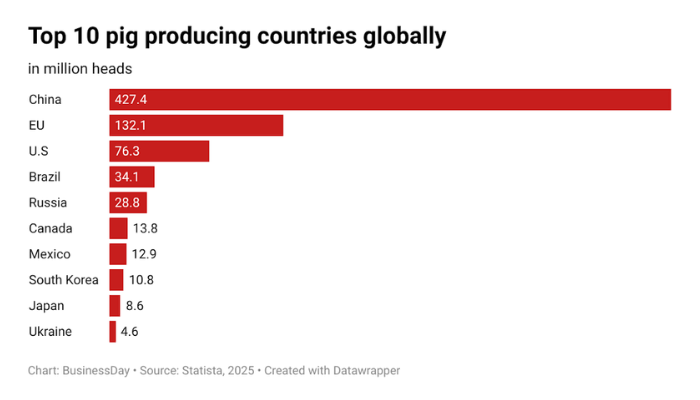Pig farming, once seen as a humble village trade, has grown into an industry that is worth over N500 billion in Nigeria. The global market size is estimated at $255 billion and Nigeria is the biggest producer in Africa, with an output of 9.5 million pigs annually.
From Asia to Europe, pork dominates the global meat scene, accounting for 36 percent of meat consumption, outstripping both beef and poultry, according to the Food and Agriculture Organisation (FAO).
The pork market, valued at $406 billion in 2025, is projected to reach $446 billion by 2030, expanding at a steady compound annual growth rate of 1.73 percent, according to Indian market intelligence firm Mordor Intelligence.
Pig business is a lucrative venture due to the animal’s high reproductive rate, rapid growth and growing demand. Entrepreneurs in the industry say pigs are prolific breeders, and a sow can reproduce a litter (8-12) of piglets.
Dan Arubasa, an agro-consultant, told BusinessDay that the world is now eating more pork than ever before.
“There’s a huge potential for young investors to tap into the opportunity, backing serious agribusiness brands and not just seeing it as a side hustle,” he explained.
Echoing this, Uchechi Agbarakwe, pig farmer and chief executive officer of UCAN Farms in Rivers State, Nigeria, said due to pigs’ high reproduction rate and profitability, he would rather use his apartment as a pig pen than rent it.
Read also: Ellah Lakes eyes top spot in piggery business amid competition
“Global investment flows are pouring into pork production, feed formulation, processing plants, logistics, packaging and exports, especially in Asia, Latin America, and Europe,” Arubasa said.
“This isn’t a small-time gig. It’s a strategic business opportunity in an industry that’s still growing,” he emphasised.
AgroNigeria highlights pig farming as a lucrative income source ripe for investment.
“With demand skyrocketing both locally and globally, pig farming provides a dependable revenue stream,” the platform noted. “Pig farming is the new oil and gas of agribusiness,” Arubasa echoed.
Why pig farming?
Pig farming is one of the fastest-growing livestock businesses, driven by pigs’ remarkable reproductive rate.
“A single sow (female pig) can deliver 8 to 12 piglets per litter(reproductive cycle), and with two litters a year, your stock can double in under 12 months when managed well,” Agbarakwe explained. This rapid growth translates to quicker returns and expanding herds.
Feed efficiency also makes pig farming cost-effective. “Pigs convert feed efficiently, growing faster on less, especially when given kitchen scraps, farm leftovers, or formulated feed,” he noted.
Meanwhile, demand for pork has continued to rise in both urban and rural markets.
From Kenya to export hubs, pork fills plates in restaurants, butcheries, and homes alike, ensuring steady buyers and a reliable investment.
Read also: Here are four agripreneurs redefining farming in Nigeria
In China alone, the pork market is valued at $120 billion, as over 60 million metric tons are consumed annually.
“Pig farming offers flexible entry points, allowing anyone—from backyard beginners to large-scale farmers—to start at their own pace with simple or advanced setups, making it accessible to youth, women, and retirees alike,” Arubasa noted.
“Beyond selling live pigs, significant profits come from value-added products like bacon, sausages, ham, and packaged pork, which can greatly boost earnings and expand market reach,” he added.
Pig farming profit model
“With just N2 million ($1,300), investors can break into pig farming and scale to monthly earnings of N500,000 to N1.2 million ($330–$800) through the sale of piglets, pork meat, and local supply contracts,” said Arubasa.
According to Isaac Lordye, CEO of Badau Farms, the key to the business lies in starting lean and growing smart. “With as low as N500,000, basic infrastructure and good breeding stock, a small farm can quickly become profitable,” he said.
“The profit margin is huge,” Lordye stated. “A single piglet can sell for anywhere between N50,000 and N70,000, and once matured, a pig can fetch between N200,000 and N500,000.
“Once you add simple pork-processing sausages, peppered pork, smoked cuts, you can boost your income by 40 to 60 percent every month.”
Arubasa emphasised the role of digital platforms in scaling operations. “A strong online presence means you’re not just selling locally,” he noted.
“With Instagram, WhatsApp, and export-ready platforms like AfCFTA’s e-marketplace, farmers can reach diaspora buyers and bulk suppliers abroad,” he added.
Experts believe that with consistent reinvestment, youth-led farms can grow into mini pork empires—hiring local staff, expanding into other African cities, and exporting to high-demand markets.
Read also: Supreme Meat Limited aspires to lead the International Premium Pork Industry
Global outlook
China remains the dominant force in global pork production, churning out more than 57 million metric tons, according to FAO reports.
The European Union and the United States are the second and third largest producers, respectively. The global pork production surpassed 116 million metric tons in 2024.
Looking ahead, the U.S. Department of Agriculture (USDA) projects modest growth in worldwide pork output in 2025.
However, this increase is expected to coincide with a slight dip in global pork exports.
On the African continent, Nigeria stands out as the top pig-producing nation. This positions Nigeria as a critical player in Africa’s livestock sector and underscores the growing importance of local production in meeting regional protein demand.
Challenges
According to experts, pig farming faces several challenges, including disease outbreaks, particularly in poor sanitary conditions; high feed costs; fluctuating market prices; risks from theft or predators requiring secure facilities; and environmental issues such as odour management and proper waste disposal practices.
Tips for success
Agbarakwe stressed the importance of starting small and gradually scaling operations to minimise risk. “Start small and build slowly,” he advised.
Lordye highlighted the value of meticulous record-keeping. “It’s essential to track every expense, feed type, and health record,” he said.
Agbarakwe stressed the need for continuous learning and staying updated with industry practices. “Joining a farmers’ group can be a great support system,” he noted. “And maintaining proper hygiene is absolutely non-negotiable,” he stated.

